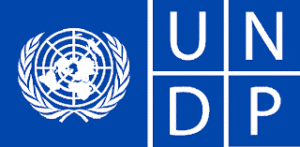Poor People's Energy Outlook 2019 - Enabling Energy Access: from Village to Nation
Considering both clean cooking and electricity, PPEO 2019 draws on a range of case study programmes and community-driven...
By drawing on the realities of energy-poor people, the PPEO series has been hugely influential in re-framing the energy access narrative. As a result of the PPEO’s awareness-raising of energy poverty and access issues, Practical Action co-designed the SEforAll Global Tracking Framework which is now the global standard in measuring levels of energy access.
“By focussing on the most vulnerable, often considered the last mile, first and by being inclusive, especially of women’s leadership, PPEO 2018 supports the SEforALL movement to go further, faster together and to make sustainable energy for all a reality”
– Rachel Kyte, former CEO and Special Representative to the UN-Secretary General for Sustainable Energy for All
PPEO 2019 is the culmination of five years’ research, exploring what it takes to realise the kinds of energy services that enable people living in energy poverty to thrive. The report compiles and updates key messages and recommendations on energy access planning (PPEO 2016), financing (PPEO 2017) and delivering at scale, while also leaving no one behind (PPEO 2018). It draws on primary research from community consultations in Bangladesh, Kenya and Togo, as well as analysis of energy access programmes across Latin America, South Asia and sub-Saharan Africa; considering how to ramp up energy access from small-scale interventions to national and global levels, to ensure that, with just a decade to go until our SDG7 deadline, the transformational power of energy is universally enjoyed.
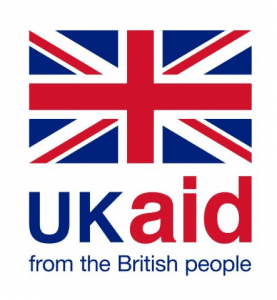
For international donors and International Financial Institutions:
For national governments:
For private sector companies and investors:
For civil society organizations:
Considering both clean cooking and electricity, PPEO 2019 draws on a range of case study programmes and community-driven...
PPEO 2019 is a compilation and update of the previous three editions of the PPEO series, on energy access planning (2016...
Considering both clean cooking and electricity, PPEO 2019 draws on a range of case study programmes and community-driven...
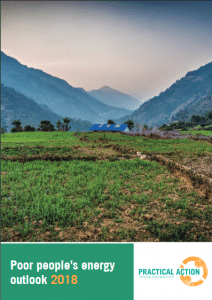
PPEO 2018 considers how access to energy can be accelerated to achieve both the scale required to meet our global 2030 goals, and the inclusivity required to leave no-one behind. The report looks at case studies from clean cooking, decentralised electricity and grid-extension programmes across Asia, Latin America and sub-Saharan Africa to explore processes that have been tried, the results these have achieved and how these could help to inform future programming.
Recommendations
Downloads
FULL REPORT English | French | Spanish SUMMARY English | French | Spanish INFOGRAPHIC English

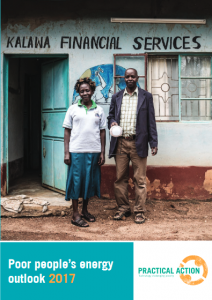 2017 – Financing National Energy Access: A Bottom Up Approach
2017 – Financing National Energy Access: A Bottom Up ApproachThe 2017 edition of the Poor People’s Energy Outlook (PPEO) considers how to best finance national integrated energy access plans for Bangladesh, Kenya and Togo based on the PPEO 2016 analysis. The report looks at the mix of technologies and funding required to achieve national and global energy access goals; and the roles of civil society and the private and public sectors in making this a reality.
Recommendations
Downloads
FULL REPORT English | French | Spanish SUMMARY English | French | Spanish INFOGRAPHIC English

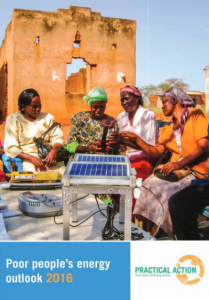 2016 – Integrating Community Energy Access Priorities into National Plans
2016 – Integrating Community Energy Access Priorities into National PlansBuilding on the Total Energy Access Framework put forth in PPEOs 2010-14, the 2016 edition explores energy access planning from the perspectives of poor people. It uses case study evidence from communities across three contrasting countries – Bangladesh, Kenya and Togo – to unpick what it means to plan for energy access from the bottom up, basing those plans on the energy needs and priorities expressed by people living in energy poverty.
Recommendations
Downloads
FULL REPORT English | French | Spanish SUMMARY English | French | Spanish INFOGRAPHICS English

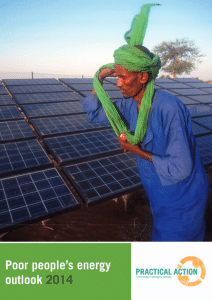 2014 – Integrating Community Energy Access Priorities into National Plans
2014 – Integrating Community Energy Access Priorities into National PlansThe 2014 edition of the PPEO reflects on three years of analysis (PPEOs 2010-13) to highlight the vital enabling role that energy plays in lifting people out of poverty; moving beyond energy sole for household uses to consider its importance for community services and productive uses.
Downloads
FULL REPORT English | Arabic | French | Spanish
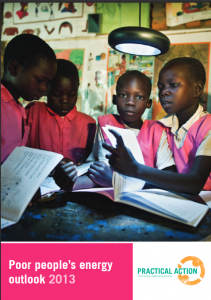 2013 – Energy for Community Services
2013 – Energy for Community ServicesPPEO 2013 considers just how essential access to energy is for community facilities. From street lighting to electricity for ICTs in schools, from running health clinics to powering religious buildings, energy access for communal benefit is essential to enable people to live the sorts of lives that they value.
Recommendations
Downloads
FULL REPORT English SUMMARY English
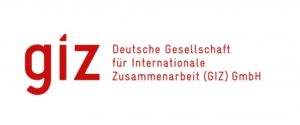
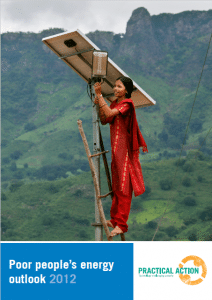 2012 – Energy for Earning a Living
2012 – Energy for Earning a LivingPPEO 2012 explores the productive uses of energy which are vital to improved livelihoods and broader human development. From electricity for powering village kiosks to energy for irrigation, milling and threshing, energy access for livelihoods increases productivity, reduces women’s burdens and positively impacts human wellbeing. It can also be key to strengthening communities’ resilience to climate shocks.
Recommendations:
Downloads
FULL REPORT English | Spanish INFOGRAPHIC English

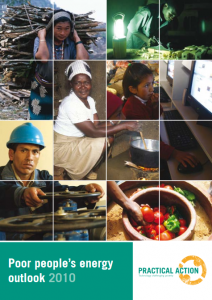 2010 – Total Energy Access
2010 – Total Energy AccessPPEO 2010 urges the energy sector to embrace the concept of ‘Total Energy Access’ which explores energy access not just for households but for community facilities and enterprises. Energy access has transformative potential for economic development and human welfare and without it, the ability to stay healthy, connected and earn a living is severely compromised.
Recommendations:
Downloads
This report was funded by UNDP.
